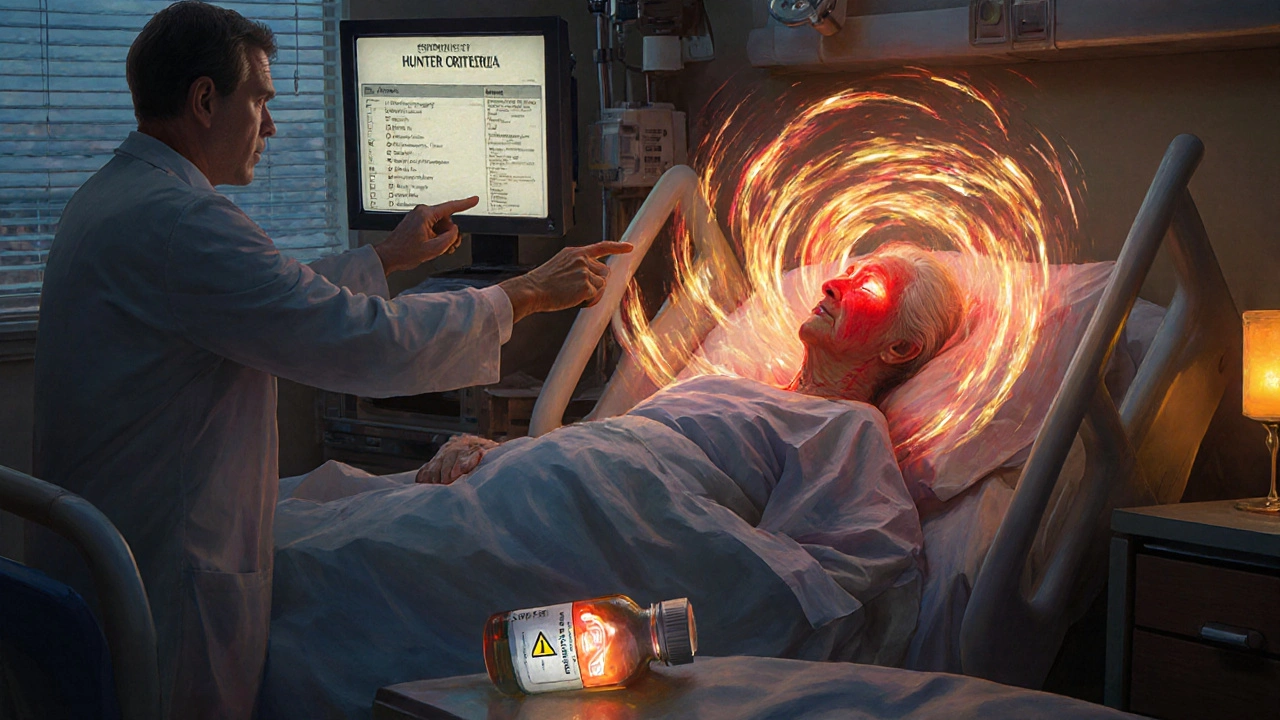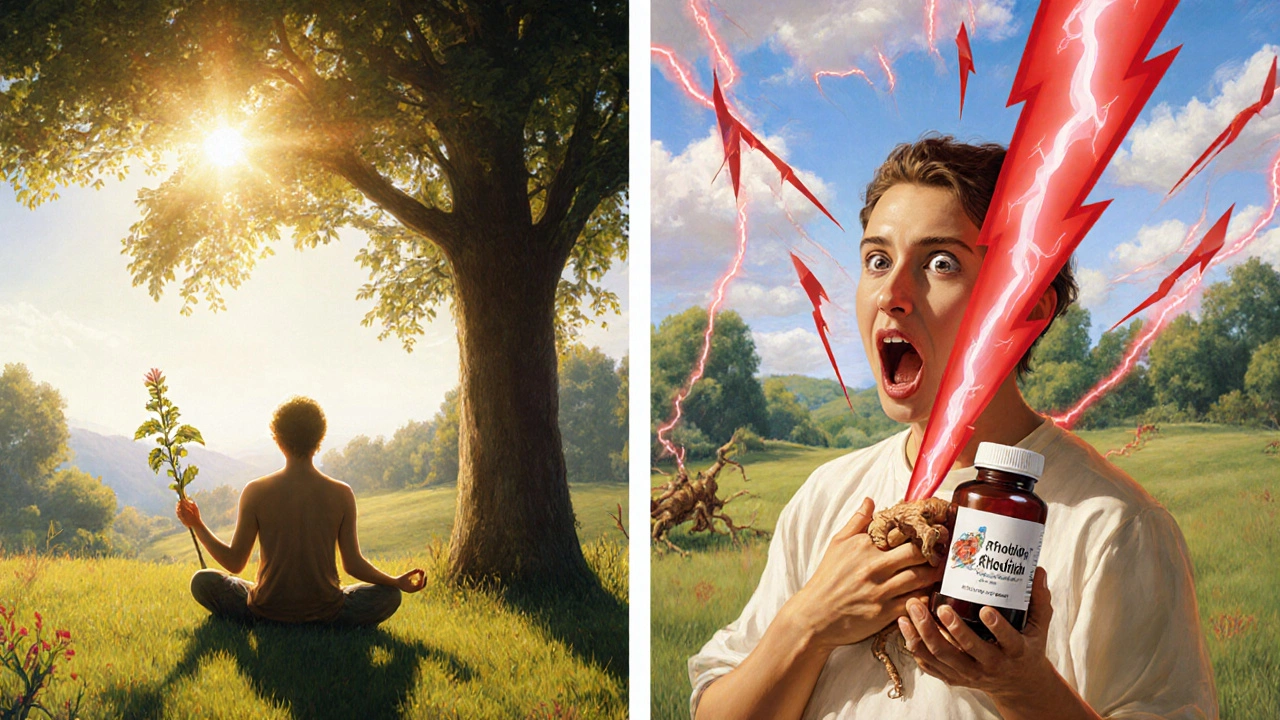Serotonin Syndrome Risk Checker
Serotonin Syndrome Risk Assessment
If you've taken Rhodiola while taking an antidepressant, check for these symptoms:
Symptom Results
Next steps:
- Stop taking Rhodiola immediately
- Do not wait for symptoms to improve
- Go to the nearest emergency room or call emergency services
- Bring the Rhodiola supplement bottle with you
Many people turn to Rhodiola rosea hoping to ease stress, fight fatigue, or lift their mood without prescription drugs. It’s marketed as a natural remedy, often labeled as a "natural antidepressant." But if you’re already taking an antidepressant-like sertraline, escitalopram, or fluoxetine-combining it with Rhodiola could be dangerous. Not just mildly risky. Rhodiola can trigger serotonin syndrome, a life-threatening condition that needs emergency care.
How Rhodiola Affects Your Brain Chemistry
Rhodiola is an adaptogen, meaning it’s supposed to help your body handle stress. Its main active ingredients, salidroside and rosavin, work by slowing down enzymes that break down serotonin and norepinephrine in your brain. Specifically, it inhibits monoamine oxidase A (MAO-A), the same enzyme targeted by older antidepressants called MAOIs. This means more serotonin hangs around in your synapses, boosting mood-on paper, that sounds good. But here’s the problem: if you’re already taking an SSRI or SNRI antidepressant, those drugs are doing the exact same thing. They block serotonin reuptake, so serotonin stays active longer. Add Rhodiola on top, and you’re essentially double-dosing on serotonin elevation. There’s no safety buffer. Your brain can’t handle that kind of overload. Studies in rats show Rhodiola can increase serotonin levels in the prefrontal cortex by 20-30% within half an hour. In humans, we don’t have precise data, but we do have real-world cases. One 69-year-old woman developed serotonin syndrome after taking Rhodiola with paroxetine. She ended up in the hospital with a fever of 102°F, muscle rigidity, and confusion. That’s not a rare fluke-it’s a predictable outcome.Serotonin Syndrome: Not Just a Side Effect, But a Medical Emergency
Serotonin syndrome isn’t a vague feeling of being "too wired." It’s a clinical diagnosis with clear signs:- High body temperature (over 101.3°F)
- Shivering or muscle twitching (clonus)
- Rapid heart rate (over 120 bpm)
- High blood pressure
- Agitation, hallucinations, or confusion
- Nausea, vomiting, or diarrhea
Who’s at Risk-and Why Most People Don’t Know
The biggest danger isn’t the supplement itself. It’s the lack of warning. A 2021 survey by the National Center for Complementary and Integrative Health found that 63.7% of people taking Rhodiola along with antidepressants had no idea it could be dangerous. Why? Because most supplement bottles don’t say anything about it. In 2021, the FDA reviewed 120 Rhodiola products. Only 22% included any warning about interactions with antidepressants. Compare that to prescription MAOIs, which come with black box warnings and detailed patient guides. Rhodiola is sold as a dietary supplement under DSHEA, which means the FDA can’t require safety testing before it hits shelves. Manufacturers aren’t held to the same standards as drug companies. Even worse, product quality is wildly inconsistent. A 2018 USP study tested 42 Rhodiola supplements. Only 13.2% actually contained the amount of salidroside listed on the label. Some had none at all. Others had double the dose. You can’t predict how your body will react if you don’t even know what you’re taking.
It’s Not Just About Serotonin
Rhodiola doesn’t just mess with your brain. It affects your whole body.- Blood pressure: It can lower systolic pressure by 8-12 mmHg. If you’re on lisinopril or other blood pressure meds, this could cause dizziness, fainting, or even organ damage.
- Blood sugar: It may drop glucose by 15-20 mg/dL. For someone on insulin or metformin, that’s a recipe for hypoglycemia-shaking, sweating, confusion, seizures.
- Immune system: Rhodiola can increase TNF-alpha, a pro-inflammatory marker. For people with rheumatoid arthritis, lupus, or multiple sclerosis, this could trigger a flare.
What Experts Say-And Why You Should Listen
Dr. Jun J. Mao, a leading integrative medicine expert at Memorial Sloan Kettering, includes Rhodiola in their official herb-drug interaction database as a high-risk compound. He’s clear: "Rhodiola has monoamine oxidase inhibitory activity, it may enhance the serotonergic side effects of antidepressant drugs." The American Psychiatric Association’s 2022 supplement interaction database labels Rhodiola as "Category X: Avoid Combination" with all serotonergic antidepressants. The American College of Medicine explicitly prohibits it. No reputable medical group supports mixing the two. Even the few studies that suggest Rhodiola might help with depression were done in people NOT taking antidepressants. One 2015 review in Phytotherapy Research floated the idea that low doses (under 200 mg/day) might be cautiously tested under supervision-but even that was theoretical. No clinical trial has ever proven it’s safe to combine them.Real People, Real Consequences
Don’t just take my word for it. Look at the user reports. On Amazon, 68% of negative reviews for Rhodiola mention antidepressant interactions. One top review says: "Developed severe tremors and panic attacks after taking Rhodiola with Lexapro-ER visit confirmed serotonin toxicity." That’s not an outlier. It’s a pattern. In a Drugs.com forum thread with over 587 comments since 2019, 94% of users warn against combining Rhodiola with SSRIs. Many describe near-fatal experiences: racing hearts, hallucinations, hospitalizations. These aren’t anecdotal flukes. They’re clinical events happening in real time. Meanwhile, the positive reviews? They’re from people taking Rhodiola alone. One user on ConsumerLab.com wrote: "200 mg daily eliminated my burnout symptoms without the dry mouth I got from Zoloft." That’s the key: Rhodiola works fine by itself. The danger is in the combo.
What Should You Do?
If you’re on an antidepressant and thinking about trying Rhodiola-stop. Don’t take it. Not even for a few days. If you’re already taking both and feel off-dizzy, shaky, hot, anxious-get medical help immediately. Don’t wait. Serotonin syndrome doesn’t get better on its own. If you want to switch from an antidepressant to Rhodiola, you need a plan. Memorial Sloan Kettering recommends a 2-week washout period after stopping an SSRI before starting Rhodiola. Why? Because some SSRIs, like paroxetine, stay in your system for weeks. You can’t just flip the switch. And if you’re a doctor or integrative health provider? You need to ask. Don’t assume patients are telling you everything they’re taking. Supplement use is underreported. Ask directly: "Are you taking any herbs, vitamins, or natural products?"The Bigger Picture
The global Rhodiola market hit $287 million in 2022. Sales are climbing because people want "natural" solutions. But natural doesn’t mean safe. St. John’s Wort used to be the go-to herbal antidepressant-until people started dying from serotonin syndrome. Now Rhodiola is taking its place, with the same risks and even less regulation. The FDA issued 14 warning letters to Rhodiola makers in 2022 for making illegal depression claims. Yet 78% of products still imply they can treat depression. That’s misleading marketing, plain and simple. Europe is starting to act. The European Medicines Agency added Rhodiola to its "Herbal Interactions Monitoring List" in January 2023. By 2025, all supplements sold in the EU must carry warnings about antidepressant interactions. The U.S. is behind. But in May 2023, the FDA issued a safety alert requiring "black box" warnings on all Rhodiola labels by Q3 2024. That’s a start-but it’s too late for many.Final Thought: Your Safety Comes First
Rhodiola isn’t evil. It’s a plant. But like any powerful substance, it has consequences. When you mix it with pharmaceuticals, you’re playing with fire. There’s no middle ground. Either you take Rhodiola alone, or you take your antidepressant alone. Not both. If you’re struggling with depression or anxiety, talk to a doctor. There are safe, proven options. You don’t need to risk your life for a supplement that’s not regulated, not standardized, and not safe to combine with your meds. Your brain matters. Your health matters. Don’t gamble with it.Can I take Rhodiola with Zoloft?
No. Combining Rhodiola with Zoloft (sertraline) significantly increases your risk of serotonin syndrome. Both substances raise serotonin levels, and together they can overwhelm your system. Even small doses of Rhodiola can trigger symptoms like rapid heartbeat, high fever, muscle rigidity, and confusion. This combination is not safe and has led to emergency hospitalizations.
Is Rhodiola a natural SSRI?
No, Rhodiola is not an SSRI. It doesn’t block serotonin reuptake like SSRIs do. Instead, it inhibits monoamine oxidase A (MAO-A), an enzyme that breaks down serotonin. This leads to more serotonin in the brain, but through a different pathway. Because of this, it’s often mistaken for an SSRI-but it’s more similar to older MAOI antidepressants, which are known for dangerous interactions.
How long should I wait after stopping an antidepressant before taking Rhodiola?
You should wait at least two weeks after stopping an SSRI before starting Rhodiola. Some antidepressants, like paroxetine, have long half-lives and can remain in your system for up to three weeks. Waiting less than two weeks increases the risk of serotonin buildup. Always consult your doctor before making any changes to your medication or supplement routine.
Are there any safe herbal alternatives to Rhodiola for depression?
There are no herbal supplements proven safe to use alongside antidepressants. St. John’s Wort, another popular herb, carries the same serotonin syndrome risk. If you’re looking for alternatives, consider evidence-based approaches like cognitive behavioral therapy (CBT), regular exercise, or light therapy-all of which have strong research backing and no interaction risks with antidepressants.
What should I do if I accidentally took Rhodiola with my antidepressant?
Stop taking Rhodiola immediately. Monitor yourself for symptoms like rapid heartbeat, high fever, muscle stiffness, confusion, or nausea. If you experience any of these, go to the nearest emergency room. Do not wait. Serotonin syndrome can progress quickly and become life-threatening within hours. Bring the supplement bottle with you so doctors can identify the ingredients.
Why don’t supplement labels warn about antidepressant interactions?
Because dietary supplements like Rhodiola are not regulated like prescription drugs. Under the DSHEA of 1994, manufacturers don’t need to prove safety or efficacy before selling. The FDA can only act after harm occurs. As a result, many products lack warning labels-even though medical evidence clearly shows the danger. A 2021 FDA review found only 22% of Rhodiola products included any interaction warning.
Can I take Rhodiola if I’m not on antidepressants?
Yes, if you’re not taking any antidepressants or MAOIs, Rhodiola may be safe for short-term use to manage stress or mild fatigue. Many users report benefits like improved focus and reduced burnout. But even then, choose products verified by USP or NSF for quality. Start with a low dose (200 mg/day), and avoid it if you have low blood pressure, diabetes, or an autoimmune condition. Always talk to your doctor before starting any new supplement.

